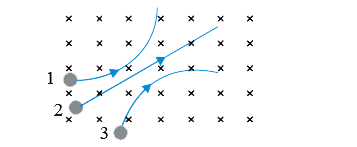A charged particle moves through a magnetic field in a direction perpendicular to it. Then the:
(1.)acceleration remain unchanged
(2.)velocity remains unchanged
(3.)speed of particles remain unchanged
(4.)direction of particles remain unchanged
accelertion remain unchanged
velocity remnains unchanged
speed of particles remain unchanged
direction of particles remain unchanged
The correct Answer is:c
To solve the question regarding the behavior of a charged particle moving through a magnetic field, we can analyze the effects of the magnetic force on the particle's motion.
1. Understanding the Motion of the Charged Particle:
- A charged particle moving in a magnetic field experiences a magnetic force. The direction of this force is given by the right-hand rule and is always perpendicular to both the velocity of the particle and the magnetic field.
2. Force on the Charged Particle:
- The magnetic force F on a charged particle with charge q, moving with velocity v in a magnetic field B is given by the equation:
F=q(v×B)
- Since the force is perpendicular to the velocity, it does not do work on the particle.
3. Effect on Speed:
- Because the magnetic force is perpendicular to the velocity, it changes the direction of the velocity but not its magnitude. Therefore, the speed of the particle remains unchanged.
4. Effect on Velocity:
- The velocity is a vector quantity, which means it has both magnitude and direction. While the speed (magnitude of velocity) remains unchanged, the direction of the velocity changes due to the magnetic force acting on the particle.
5. Effect on Acceleration:
- The acceleration of the particle is determined by the net force acting on it. Since the magnetic force is acting on the particle, it will experience acceleration, but the magnitude of acceleration can change depending on the path taken.
6. Effect on Direction:
- The direction of the particle's motion will change continuously as it moves through the magnetic field due to the perpendicular force acting on it.
Conclusion:
Based on the analysis, the correct statement is:
- (3) The speed of the particle remains unchanged.
- A charged particle moving in a magnetic field experiences a magnetic force. The direction of this force is given by the right-hand rule and is always perpendicular to both the velocity of the particle and the magnetic field.
- The magnetic force F on a charged particle with charge q, moving with velocity v in a magnetic field B is given by the equation:
F=q(v×B)
- Since the force is perpendicular to the velocity, it does not do work on the particle.
- Because the magnetic force is perpendicular to the velocity, it changes the direction of the velocity but not its magnitude. Therefore, the speed of the particle remains unchanged.
- The velocity is a vector quantity, which means it has both magnitude and direction. While the speed (magnitude of velocity) remains unchanged, the direction of the velocity changes due to the magnetic force acting on the particle.
- The acceleration of the particle is determined by the net force acting on it. Since the magnetic force is acting on the particle, it will experience acceleration, but the magnitude of acceleration can change depending on the path taken.
- The direction of the particle's motion will change continuously as it moves through the magnetic field due to the perpendicular force acting on it.
Based on the analysis, the correct statement is:
- (3) The speed of the particle remains unchanged.
Similar Questions
Knowledge Check
Quantity that remains unchanged in a transformer is
AvoltageBcurrentCfrequencyDNone of theseQuantity that remains unchanged in a transformer is
AvoltageBcurrentCfrequencyDnone of the above.
A catalyst remains unchanged at the end of the reaction regarding:
View SolutionVelocity of a charged particle can remain unchanged. If
View SolutionDensity of a crystal remains unchanged as a result of :
View SolutionThe magnetic force on a charged particle is always perpendicular to its velocity. Can the magnetic force change the velocity of the particle? Speed of the particle?
View SolutionParticles 1, 2 and 3 are moving perpendicular to a uniform magnetic field, then particle

View SolutionA catalyst remains unchanged chemically at the end of the reaction. True/False
View Solution